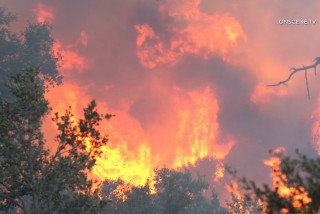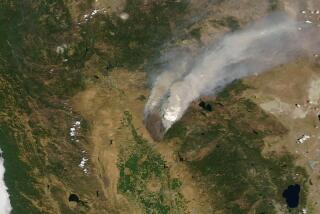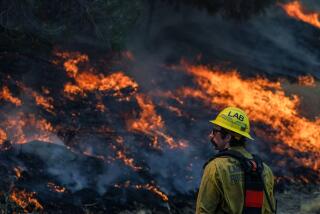Yosemite fire grows to 348 square miles, 4th-largest in state history
The Rim fire burning in and around Yosemite National Park became the fourth-largest blaze in California history as it grew to 348 square miles Sunday, officials said.
The wildfire, which began Aug. 17, is 40% contained with more than 5,000 firefighters battling the flames, according to the U.S. Forest Service. A September 1932 fire in Ventura County that burned 343 square miles previously held the spot, Cal Fire said.
San Diegoâs 427-square-mile Cedar fire in Oct. 2003, which destroyed more than 2,800 structures and killed 14, remains the largest wildfire in state history. The blaze began as a signal fire set by a West Covina man who was separated from his companion on a deer hunting trip, according to Times archives.
Crews are making good progress on the Rim fire, particularly on the northwest side of the blaze, though local winds sparked new spot fires and the fire is continuing to expand to the northeast, said U.S. Forest Service spokesman Trevor Augustino.
Winds have declined from earlier in the week, and a short rain shower Saturday night and higher humidity levels have helped mitigate some of the fire danger, he said.
âAny rain we get would be a tremendous asset,â he said, adding that the drought conditions and rugged, remote terrain have been challenging for firefighters.
Wind shifts on Friday dumped smoke into the Yosemite Valley, which appeared hazy with decreased visibility on video streaming from webcams the park. Another shift in the wind is expected Monday or Tuesday, which should help clear the smoke out of the area, said park ranger Kari Cobb.
There has been a noticeable decline in visitors to the park, she said, partly because of the fireâs smoke but also because of road closures in the park.
Park officials are advising visitors to avoid strenuous activity and for those sensitive to smoke to avoid being outside.
The Rim fire has destroyed 111 structures, 11 of them residential, and is expected to be contained Sept. 20, said Cal Fire spokesman Daniel Berlant. No structures inside the national park have been lost, Cobb said.
Battling the blaze, the largest in California this year, has so far cost $60 million in state and federal funds, Augustino said.
Six other fires are burning in California, down from about a dozen last week, with more than 8,000 firefighting personnel deployed across the state, Berlant said. Recent weeks have seen an increase in fire activity, he said, because of dry conditions, gusty winds and dry lightning that sparked several hundred fires.
Fire officials are advising those camping over Labor Day weekend to be cautious and aware of fire restrictions when lighting campfires.
Some fire crews are being released as they reach the end of their two-week assignments, but reinforcements will be brought in as needed, Augustino said. Many are local forces, he said, and are likely to be back after a few days of rest if theyâre still needed.
Investigators are still trying to determine what caused the Rim fire, Augustino said, adding that progress had been made in the case but no additional details were available.
Todd McNeal, a fire chief in Twain Harte, told a community meeting that an illegal marijuana-growing operation could have sparked the fire, the San Jose Mercury News reported.
On Aug. 23, Gov. Jerry Brown extended a state of emergency to include the city and county of San Francisco because of a threat to utilities. Since the fire began, water quality at the Hetch Hetchy reservoir, which serves customers in the San Francisco Bay Area, is unchanged, according to the San Francisco Public Utilities Commission.
The fire has forced the shutdown of two of three hydroelectric power station transmission lines that carry power to the San Francisco area. Supplementary power has cost the city $865,000 since the plants were taken offline Aug. 19, the SFPUC said. Crews continue to clean and inspect transmission lines from one of the plants, according to the commission.
There are no mandatory evacuations or advisories for Mariposa County, but an advisory remains in effect for Ponderosa Hills and areas east along Highway 108 to Pinecrest. Highway 120 at the Yosemite National Park west to Buck Meadows has been evacuated.
ALSO:
Inmate held in Patton Hospital beating death
Weather to cool down for Labor Day, then heat up again
Man questioned in death of woman who fell out of car on freeway
Twitter: @Sam_Schaefer
More to Read
Sign up for Essential California
The most important California stories and recommendations in your inbox every morning.
You may occasionally receive promotional content from the Los Angeles Times.











